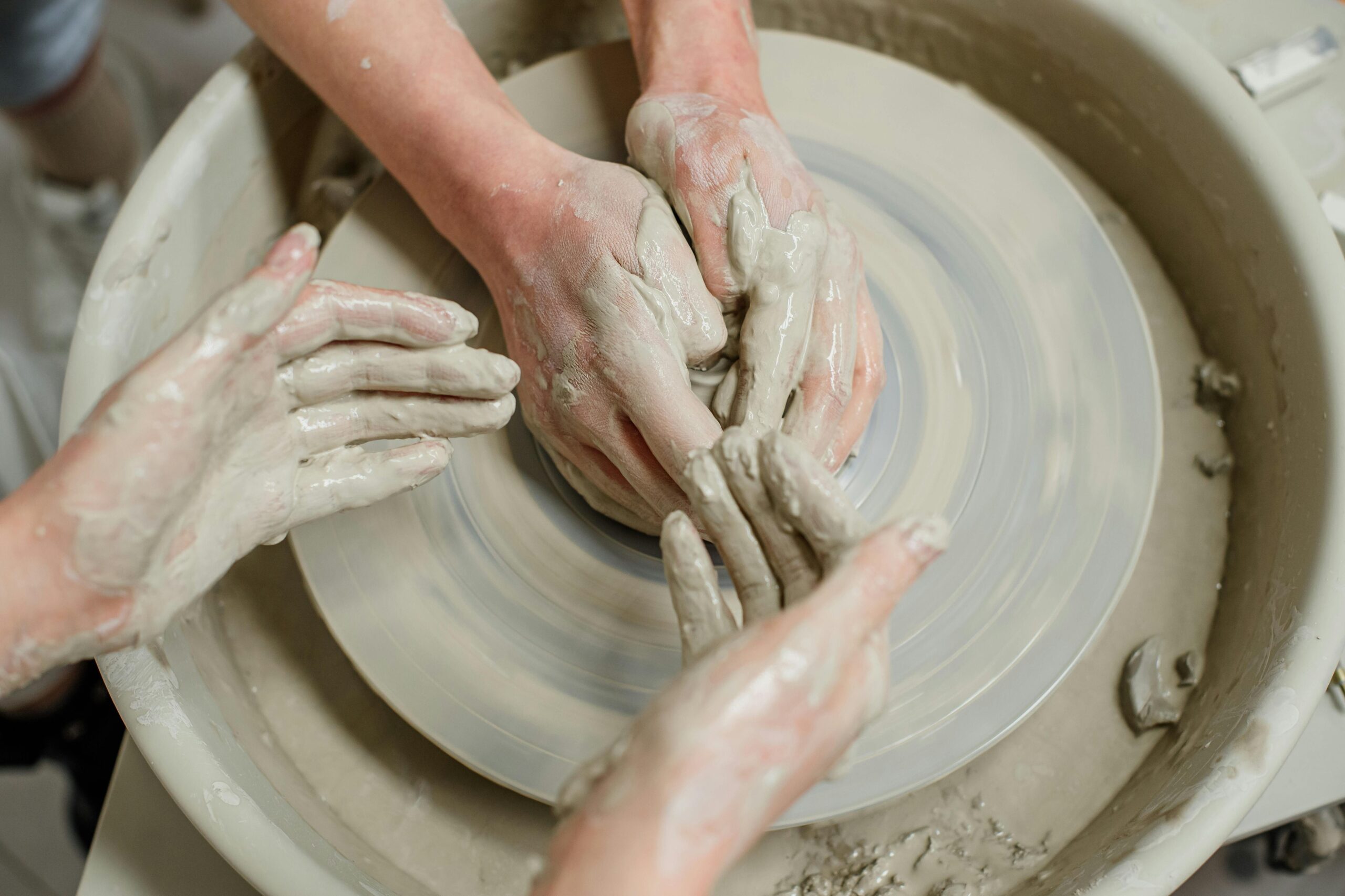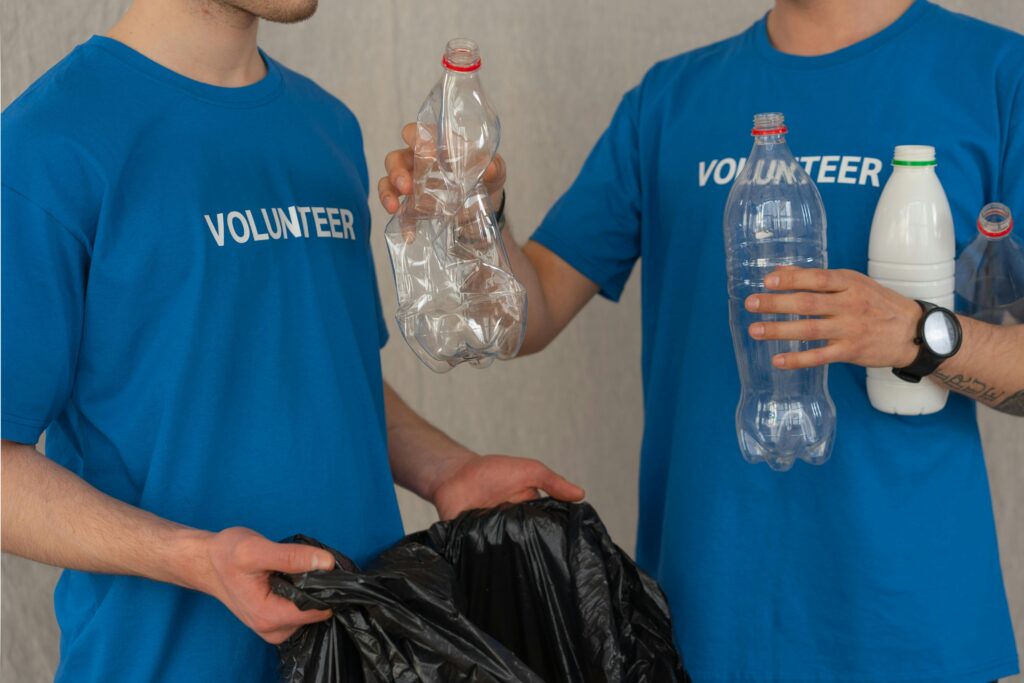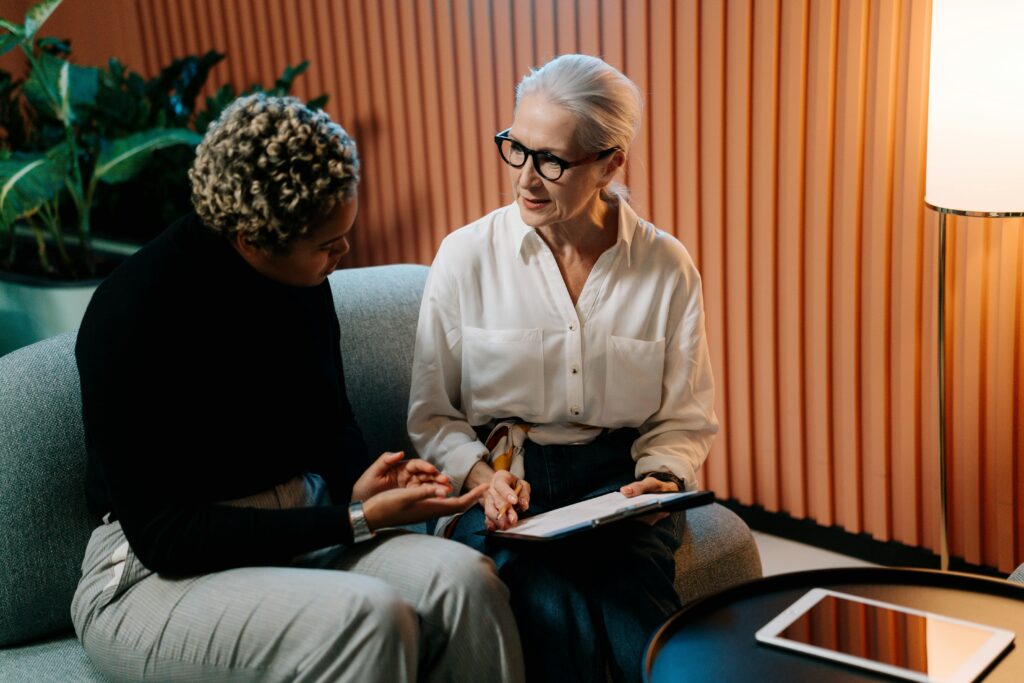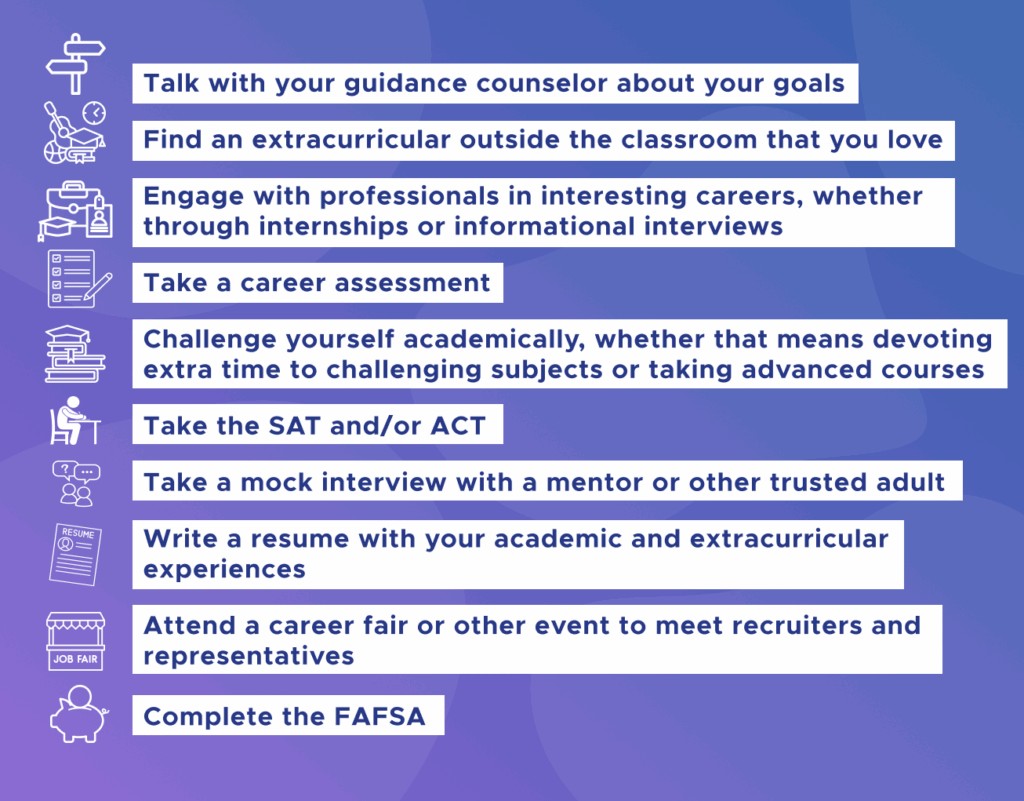
College and Career Readiness
High school graduation is right around the corner — or maybe it’s just passed. Now you find yourself facing the prospect of college or the workforce. How is your college and career readiness? College and career readiness standards are designed to assess academic knowledge, practical skills, and more. But what does that really mean for your future? How can you know if your college and career readiness is adequate for your goals?
In this article, we’ll cover everything you need to know about college and career readiness as you depart high school. Ahead, you’ll learn about topics like:
- The meaning and importance of college and career readiness
- Differences between college readiness and career readiness
- Ways to work on college and career readiness as a high school student, in and out of the classroom
- Tips and resources for career exploration for students
- Tips for deciding if you should focus more on college readiness or career preparation when planning for post-graduation life
Big life changes are never easy, but with the right preparation, you can graduate with confidence and hit the ground running. Let’s kick off by defining what we mean by college and career readiness.
What is college and career readiness?
In a nutshell, college and career readiness means having the knowledge, skills, and mindset necessary to succeed in university or work. There is no one perfect combination of these things, as you’ll learn in this article. A balance of each goes a long way: the ability to self-study and learn proactively can make up for knowledge gaps. By the same token, fundamental knowledge and a desire to develop yourself can help you cultivate important skills.
Note that we aren’t just talking about college readiness, because not everyone goes to college. Career readiness encompasses a wide variety of paths and possibilities, from apprenticeships to trade and vocational schools. These types of direct-to-workforce programs teach practical skills and knowledge to prepare you for certain careers.
Remember that college and career readiness standards include a balance of hard and soft skills. While academic knowledge is important, especially for college, there are other important elements too. Don’t overlook skills in communication, time and task management, and problem-solving. The ability to manage your own affairs and your relationships with others is essential to college and career readiness.
College and Career Readiness Standards

Over the last few decades, creating standards for assessing college readiness in American students has fluctuated between the state and national level. National education standards like the Common Core tried to establish key benchmarks and milestones for students by grade level in mathematics and English language arts. Some states have adopted these standards, while others have not.
Other states and school districts have instead opted to create their own standards for assessing college and career readiness. For example, New York has both college and career readiness standards, outlined here in their Career Development and Occupational Studies Resource Guide. Check your state standards to learn if there are specialized career readiness or college readiness benchmarks.
Outside of government standards, the infamous SAT and ACT also have their own college and career readiness benchmarks. These benchmarks are based on each test’s scoring system and essentially evaluate academic knowledge to determine college readiness. If you meet or beat the benchmark score in a subject area, it means you’ve shown the knowledge and skills needed to handle college-level work in that particular subject.
What does it mean to be college and career ready?
As mentioned above, college and career readiness is about more than just academic or specialized knowledge. When you are finishing high school, you are on the cusp of adult life — you need to be prepared for its challenges. Your strengths and skills will become the foundation on which you build your entire academic and/or professional life. As such, you need the ability to leverage and continually improve these skills.
What does college and career readiness look like? Soft skills like goal setting and perseverance are important for taking ownership of your work and getting it done. Communication skills improve your ability to work in collaborative settings and can help you find help and resources. When things inevitably don’t go your way, resilience will allow you to learn from the experience and keep moving forward.
With the increasing pressure of the college application process, it can feel like a good GPA and academic knowledge are the biggest factors in determining your path forward. However, college and career readiness is also about being emotionally, socially, and financially prepared for postsecondary life. Your late teens and early twenties are a time of immense growth and change, and it takes more than academic success to navigate it.
How to Get Started in High School
It’s never too early to get started with college and career readiness, including your first two years of high school. As a freshman or sophomore, you can explore fields of study or career paths you might want to pursue. Career exploration for students in early high school can mean doing research or taking career tests, but experiential learning benefits are also numerous. Try to reach out to experts in interesting fields to ask about their academic path and career preparation. There are plenty of ways to learn about potential careers without doing traditional internships, as long as you’re proactive.
In the classroom, try to challenge yourself academically with rigorous coursework in your area of interest. Look for honors, AP, IB, and dual enrollment courses in your high school catalog. If you’re looking for extra academic knowledge, consider undertaking independent research projects, or even reaching out to local college professors for guidance. Choosing for yourself what courses you’ll take, managing a challenging course load, and seeking new academic knowledge is great for college readiness. Not to mention, you’ll have an easier time meeting college and career readiness standards if you’re already succeeding in high-level courses.
Personal responsibility is another fundamental element of college and career readiness, so find ways to take on more responsibility. Are there additional chores or household tasks you can handle? Can you pursue leadership positions in extracurricular activities or in your community? Do you have the means to work a part-time job? Any of these could instill a greater sense of responsibility and independence.
Extracurriculars and Passion Projects

Extracurricular activities and passion projects are usually mentioned in the same breath as college applications. In addition to rounding out your applicant profile, academic and career exploration through activities like these are great ways to gain new experiences and skills. Self-started projects and leadership positions are particularly great for bolstering your college and career readiness.
When you think of extracurriculars in high school, there are several tried-and-true examples that likely come to mind. You know them well: school clubs, sports teams, volunteering, communities at your place of worship, and the like. But the possibilities are endless. You could learn a new skill as a passion project, like knitting, pottery, or a musical instrument. If you’re artistically inclined, you may consider using social media to archive your work and connect with other artists. Just remember, if you’re thinking of college and career readiness, the important part is being disciplined and self-motivated, not being the best.
If you’ve heard it once, you’ve heard it a thousand times: quality over quantity. Another part of college readiness and career readiness is consistency — can you see a project through to the end? One long-term, meaningful project through which you grow and change is often more impactful than several short stints in different areas. While activity and career exploration is important, don’t let every shiny new thing draw your attention. Be selective in how you spend your time and energy.
Internships for Career Exploration
While internships are often conflated with college internships, it’s possible to do similar activities while still in high school. High school and college internships, whether in-person or online, paid or informal, offer many experiential learning benefits. Plus, college and career readiness standards often assume a familiarity with your intended field, which you can gain through internships.
There are many ways to approach potential mentors, employers, and internship hosts about opportunities. Start by looking close by, since personal relationships can make it easier to land an internship. Perhaps you or a friend’s parent or guardian has an interesting job where you can tag along or shadow someone. There may also be local businesses, news stations, or non-profit organizations you could contact. Of course, your school also likely has opportunities, either through your guidance counselor or particular teachers. Finally, consider using online platforms or directories focusing on career exploration for students.
High school and college internships are not the alpha and omega of career exploration for students. College and career readiness standards don’t include internship hours, but rather a grasp of important skills and knowledge required. In light of that, don’t discount the importance of non-internship opportunities like informational interviews with people working in interesting fields. Activities like job shadowing and educational summer programs also have lots of experiential learning benefits. If internships aren’t available, there are many other ways to work on your career readiness.
College and Career Readiness Activities
Now, let’s list out several categories and specific actions you can take for your college and career readiness.
Extracurricular activities

Join or start a school club to practice cooperation, pursue an interest, and even build leadership skills.
Volunteer in your community to cultivate care for others and practice serving something bigger than yourself.
Participate in a summer pre-college or enrichment program, where you can learn alongside new peers and gain new skills.
Learn a new skill like a musical instrument to practice discipline, tenacity, and applying yourself.
Career exploration

Attend a career fair to meet company representatives and learn about different jobs.
Take a career assessment and learn how your personality, skills, and values can translate to the workforce.
Complete an internship or job shadowing experience, which can teach you what it’s like to work in a particular occupation.
Have an informational interview to practice your communication skills and learn about certain jobs and companies.
Interview and career preparation

Create a resume, learning what employers look for and how to portray your experiences professionally.
Discuss career paths with your guidance counselor — they can offer advice and perhaps even connect you with helpful people.
Plan the courses and training you need for your desired career track, so you can choose your next steps with ease.
Take a mock job interview to practice answering common interview questions, speaking professionally, and presenting yourself well.
Life skills

Practice basic personal finance like budgeting and tracking expenses to learn how to manage your money.
Keep an agenda or calendar to track tasks and important dates, practicing organizational skills and keeping yourself accountable.
Learn how to cook basic recipes that you like, so that you can be self-reliant for meals.
Practice physical, mental, and emotional self-care through self-reflection, journaling, and talking with people you trust.
Whichever of these college and career readiness activities you choose to do, try to track your progress through a physical or digital log. This way, you can see what works, remember thoughts you had along the way, and even pivot if certain paths aren’t seeming to work out.
More College and Career Readiness Resources
There are a lot of resources out there about college and career readiness. If you’re curious about how you compare to college and career readiness standards, try starting with some basic assessments. The Occupational Information Network (O*NET), under the U.S. Department of Labor, offers an Interest Profiler to find careers matching your interests. Similarly, the CareerExplorer career test asks about interests, personality, and skills to suggest careers. Yale University even has this directory of tools about career exploration for students.
There are more general college and career readiness resources available, too. The ACT has an extensive page of high school resources for whatever path you’re facing. They have everything from advice on developing good study habits to a dual enrollment FAQ. The National PTA also has a page of career readiness and college readiness resources, as well as frequently asked questions. Their page is a good starting point for students looking for information on alternatives to four-year colleges. Finally, check out organizations like EVERFI, which provides resources about financial literacy and funding college.
While there are endless resources online, don’t forget to look locally, too. School guidance counselors are the most obvious option, as understanding college and career readiness standards is a large part of their job. If there are career centers in your area, see if they offer guidance or services for high school students. They may have mentorship programs, or even internship or shadowing opportunities with local partners. There are also college access programs like AVID and GEAR UP that support college readiness in students from socioeconomically disadvantaged backgrounds.
Choosing Your Path: Higher Education or the Workforce
After graduation, many students choose one of two valid, valuable pathways: going to college or getting a job. While many resources aimed at high school seniors prioritize university, entering the workforce is also very common. When facing this decision, take plenty of time to consider your goals, personal circumstances, and your college and career readiness.
The obvious benefit of going straight to work or a job training program is financial. Rather than potentially paying thousands of dollars for university, you’ll be paid to work. You also won’t have to commit to a two- or four-year college degree. However, a potential downside is decreased earning potential later on, as postsecondary degrees typically lead to higher salaries. Additionally, you may not be able to pursue certain academic interests or spend time developing your academic knowledge like you could in college.
There are other paths as well. Some students enter trade schools, where they receive specialized training for skilled trades like carpentry or cosmetology. Others pursue certification programs for similar reasons, getting certified to practice a particular job. Yet others enter community college, taking classes for an associate’s degree or to transfer to a larger university after a few semesters. Some other high school graduates enter the military, which has its own pros and cons.
When deciding what path to take after high school, don’t rush it. Think carefully about your skills and interests, as well as the job market and prospects. Millions of students flooded computer science programs in the 2010s, so the market there is saturated. On the other hand, trades of all kinds are hungry for new talent. Think also about your long-term goals: if your ultimate goal requires a high level of academic knowledge and specialization, consider college. Finally, be realistic about our own strengths. If you don’t think you’re responsible enough yet to manage university, you don’t have to go right away.
College and Career Readiness Checklist
We’ve talked a lot about the skills and experiences you need for college and career readiness. Let’s look at some items that should be at the top of your to-do list before graduating high school.

Obviously, this list is by no means exhaustive, and it may even be a bit different for you. However, for many students, this is a great checklist to start making sure your college and career readiness is adequate.
5 Tips to Get College and Career Ready
Before we close out, here are our top five tips for meeting college and career readiness standards.
5 College and Career Readiness Tips

1. Meet with your school counselor at least once a year.
Meeting with your school counselor is an important part of college and career readiness. Counselors can offer valuable insight into postsecondary options and introduce you to relevant resources. They can also advise you on your class selection and how you can better position yourself for your goals after graduation.
2. Get involved in at least one activity outside of class.
It can be tempting to get home and chill after school, but it’s worthwhile to expand your horizons. Doing something outside of class makes you a more well-rounded person and can introduce you to all kinds of new experiences. Whether you’re volunteering or playing a sport, extracurricular activities can bring you in contact with new people, new skills, and new worldviews.
3. Keep a running list of your achievements, activities, and interests.
As you progress through high school, you will grow and change in many ways. Keeping track of these changes can help you stay in touch with yourself. More pragmatically, a list of your activities and interests can help you plan for summer activities, extracurriculars, and career exploration.
4. Spend time exploring different career paths.
There’s no need to lock yourself into one career path early; in fact, even if you’re certain about your choice, explore! By learning about and experiencing different careers, you gain a greater understanding of the world of work. You never know — you may even find that you change your mind after trying something new.
5. Build confidence in your “life” skills.
Take time in high school to work on important life skills while you still have a safety net of support. The more you cook, clean, budget, and practice skills like self-care and self-advocacy, the more comfortable you’ll be after graduation. The habits you build as a teenager will follow you in some way or other for the rest of your life — make them good ones.
College and Career Readiness- Takeaways
In this article, we talked about college and career readiness: what it is, why you need it, and how to build it. Once you graduate, whether you go to work or school, there are a number of fundamental skills you need. It’s wise to start working on personal responsibility while you’re still in high school. In and out of the classroom, find ways to pursue interests and work toward career goals. Leave yourself room to explore and learn about all kinds of paths and people. After all, you’re just starting out, so your options are still nearly limitless.
Still feel like you need to work on your college readiness or career readiness? CollegeAdvisor is here to help. We have lots of free resources all about planning for postsecondary life, from university to the world of work. If you need more support, our experts can offer personalized support in your journey toward college, careers, and beyond.

This article was written by Gina Goosby. Looking for more admissions support? Click here to schedule a free meeting with one of our Admissions Specialists. During your meeting, our team will discuss your profile and help you find targeted ways to increase your admissions odds at top schools. We’ll also answer any questions and discuss how CollegeAdvisor.com can support you in the college application process.
